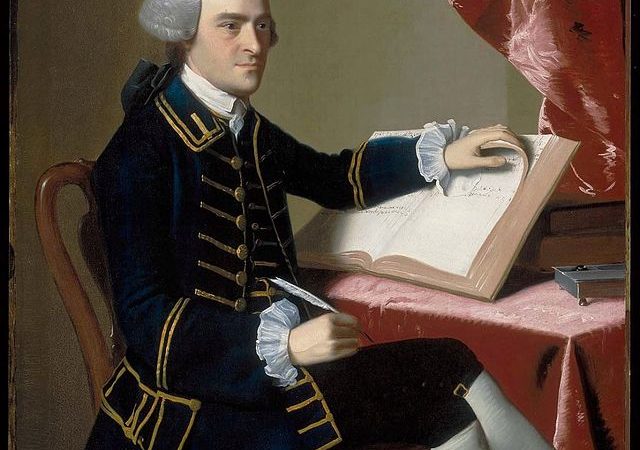On March 5, 1774–250 years ago this month–John Hancock cemented his legacy as a leader of colonial resistance to British rule when he delivered his “Boston Massacre Oration” on the fourth anniversary of the murder of civilian colonists by British troops.
The tragic event was a touchstone of resistance to royal subjugation of the American colonies.
While it was one thing to have British troops protecting the colonists and fending off the territorial ambitions of the French, stationing troops in a city for the express purpose of enforcing parliamentary law against unwilling colonial acquiesce was quite another. If ever there was an attractive nuisance, redcoat troops surely qualified.
Once the French threat was eliminated, the relationship between Great Britain and her American colonies started down the proverbial slippery slope. Parliament would act, and in the case of Boston in particular and Massachusetts in general, reaction followed. Initially this to and fro was merely rhetorical, but with each counter measure of a parliamentary act aimed at extracting revenue, the conflict escalated. The Boston Massacre changed the rules of engagement significantly when black and white colonists were killed.
To make sure this event would never be forgotten, Boston patriots were determined to commemorate each anniversary with an annual speech to reflect on the massacre so the sacrifices in lives would not be in vain and British malfeasance remembered defiantly.
Hancock was a natural leader and had the bona fides to establish himself as an opponent of British rule. His run-ins with British authority were well known, but it took time for him to move from attempting to negotiate with Royal administrators to leading the charge against British occupation. By threat of colonial militia force, Hancock convinced the British to stand down and vacate parts of Boston, which gave him significant status and propelled him into leadership positions in the legislature and as a moderator to discuss options to oppose the royal tax on tea.
While he did not directly participate in the initial Boston Tea Party, his leadership in organizing a resistance to the tax on tea was an animating force. Hancock initially attempted to protest the tax indirectly, first by forcing the revenue agents to resign or protest their role as tax collectors for an unpopular levy. When that failed, he took further action to prevent stevedores from unloading the cargo, but as that effort appeared to be similarly unsuccessful, Hancock encouraged other alternatives without providing specifics. The end result would be the dumping of tea in the harbor by revolutionaries dressed up as Mohawk Indians.
Boston became the hotbed of revolutionary activity as the destruction of tea galvanized Parliament, and given the indirect leadership role Hancock played, it seemed natural that he would be tapped to give the Massacre Day speech.
Hancock’s speech was really a masterpiece of colonial revolutionary rhetoric. Feigning modesty at being called on to speak when others were more qualified, he recounted the circumstances for British troops to be stationed in Boston in the first place. His speech then invoked the inappropriate power of the King, detailed illegal acts of Parliament and proceeded into high gear by recalling the colonists who were killed and naming the British soldiers responsible. He appealed to listeners to remember the sacrifice and act similarly for the cause of freedom and liberty.
Hancock’s speech was also noteworthy for his references to “America,” which, in hindsight, appears to be an acknowledgement of an independent country. While he falls short of calling for specific action, his rhetoric was enough to inflame the crowd. To find an outlet for their heightened emotions, some in the crowd remembered that casks of the tea not dumped in Boston Harbor were stored in a warehouse.
So, in the final act of the Boston Tea Party, colonists again dressed as Mohawk Indians and headed to take direct action. As they had done a few months previous, they opened the containers of tea and unceremoniously dumped them into the harbor. Their vandalism, which the British no doubt considered terrorism, was carried out in full knowledge of the consequences.
If Hancock’s oration was not the direct cause, it was surely a contributing factor to the final setting of the tea party. His fame would grow among the colonists as his speech was widely publicized, and from that point forward, he would be a leader in the various stages of moving toward independence from Britain.
In America, the direct action of the Bostonians was cheered throughout the colonies, and the act of defiance was seen as an expression of an outlet for pent up frustration against British strong-arm tactics. But not all Americans agreed–as several statesmen, like Benjamin Franklin, realized that legal and diplomatic recourse was the better method. Dumping tea was the destruction of private property for which there was no self-help rule under colonial laws.
Regrettably, in the fog of this unrest, both sides overreacted and set both the colonists and King on a collision course. Parliament would ratchet up more sanctions, which only served to unify the colonists.
Hancock’s speech never advocated force, and, instead, set the stage for passive resistance in the form of a boycott of English goods, but when both sides became recalcitrant, war became inevitable. The patriot, whose signature would one day famously grace the Declaration of Independence, could not have anticipated that little over a year later, when troops were sent to arrest him, the first military casualties would occur at Lexington and Concord. In many ways, it can be argued, the war was started on his account.
Hancock’s words from two-and-a-half centuries ago still ring true: “I have the most animating confidence that the present noble struggle for liberty will terminate gloriously for America.” He was right, but before victory was the hard road on which Hancock was a lead player and significant contributor.
His massacre speech made him a household name, thrusting him into a leadership position that ultimately created an independent America.
Will Sellers on March 5, 2024

